 Saudi Arabia and Qatar Sign Landmark Agreement for Riyadh–Doha High-Speed Rail Link
Saudi Arabia and Qatar Sign Landmark Agreement for Riyadh–Doha High-Speed Rail Link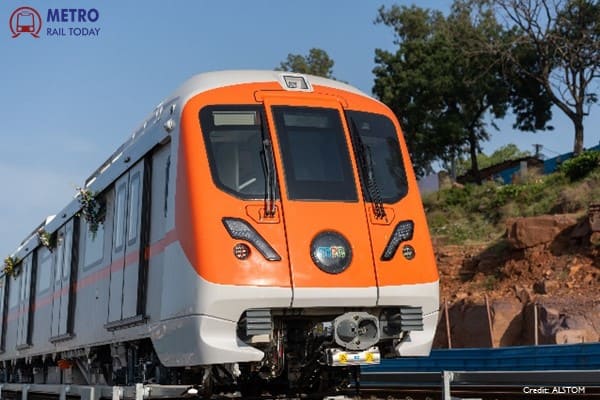 PM Narendra Modi to inaugurate Bhopal Metro operations on December 20, CMRS approval received
PM Narendra Modi to inaugurate Bhopal Metro operations on December 20, CMRS approval received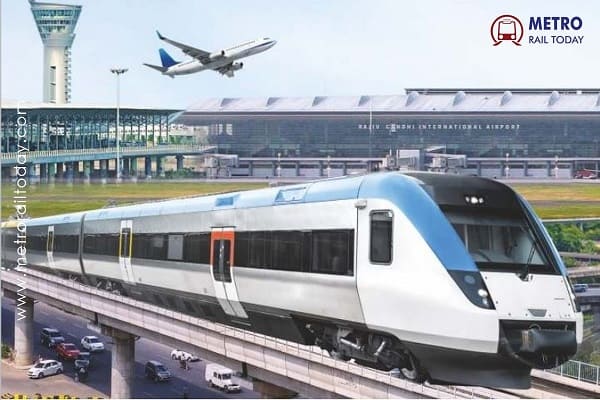 Centre orders NCRTC to prepare revised DPR for ₹20,637 crore Delhi-Noida Airport RRTS Corridor
Centre orders NCRTC to prepare revised DPR for ₹20,637 crore Delhi-Noida Airport RRTS Corridor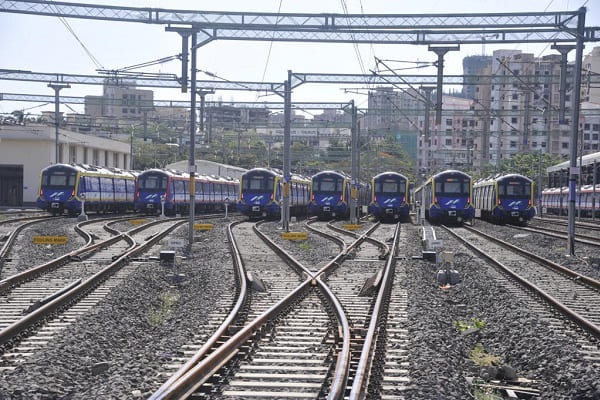 Mumbai Metro deploys Indigenous AI-Based Wheel Profile Monitoring System in Charkop Depot
Mumbai Metro deploys Indigenous AI-Based Wheel Profile Monitoring System in Charkop Depot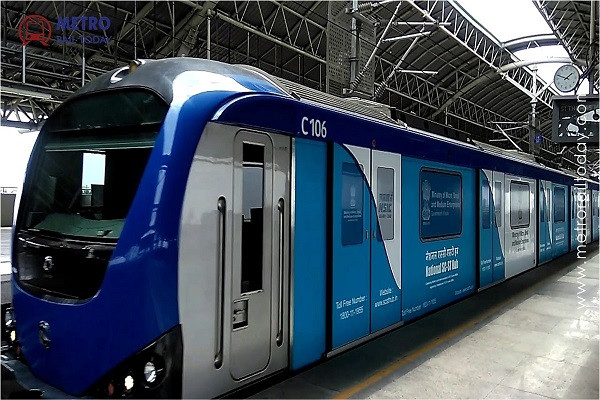 ADB approves $240 million loan to accelerate Chennai Metro Phase 2 Expansion
ADB approves $240 million loan to accelerate Chennai Metro Phase 2 Expansion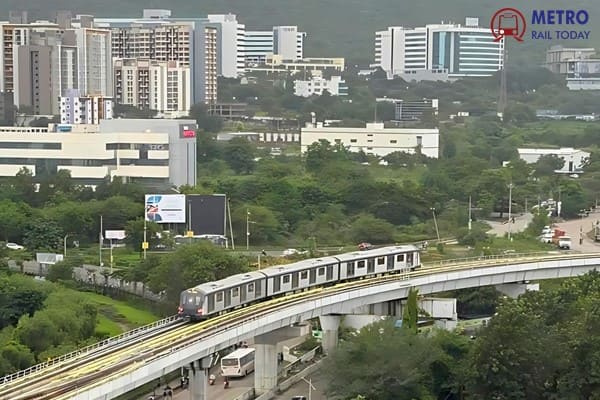 Kalpataru Projects-HG Infra Engg JV bags ₹1,415 Crore EPC Contract for Thane Metro Rail Project
Kalpataru Projects-HG Infra Engg JV bags ₹1,415 Crore EPC Contract for Thane Metro Rail Project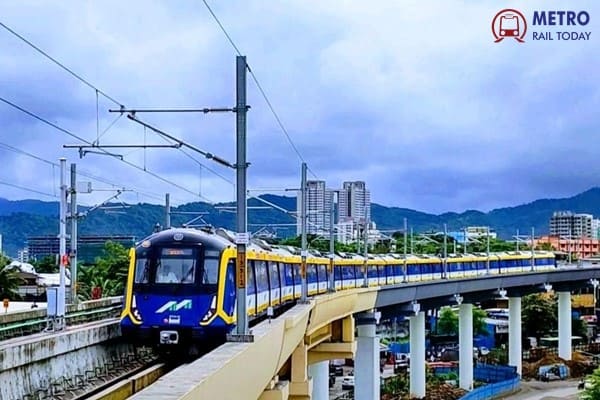 MAHA Metro floats ₹223.70 Crore Civil Tender for Six Elevated Stations of Thane Metro Rail Project
MAHA Metro floats ₹223.70 Crore Civil Tender for Six Elevated Stations of Thane Metro Rail Project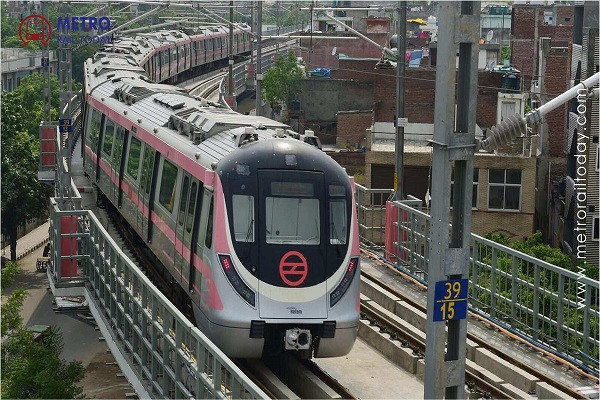 Construction begins on Delhi Metro Phase 4's Saket G Block–Lajpat Nagar Corridor
Construction begins on Delhi Metro Phase 4's Saket G Block–Lajpat Nagar Corridor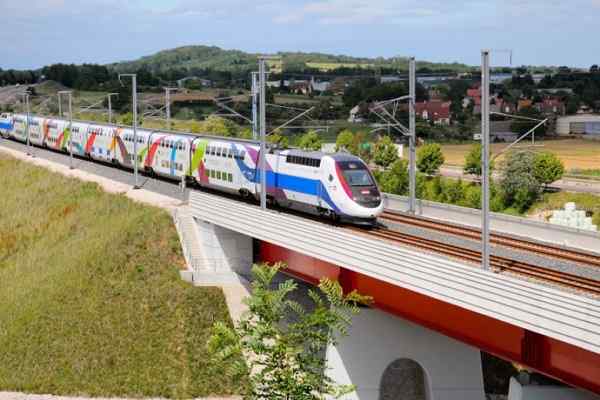 Kerala proposes RRTS as alternative to K-Rail Silver Line, Eyes faster clearances under Metro Policy
Kerala proposes RRTS as alternative to K-Rail Silver Line, Eyes faster clearances under Metro Policy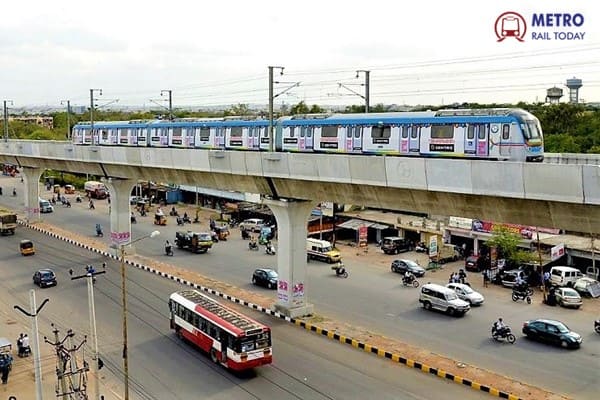 India’s Metro Rail Network crosses 1,080 km as Southern States drive expansion
India’s Metro Rail Network crosses 1,080 km as Southern States drive expansion
Blockchain-Powered Transit: Transforming Public Mobility Across Metro, MRTS, Railways and Buses
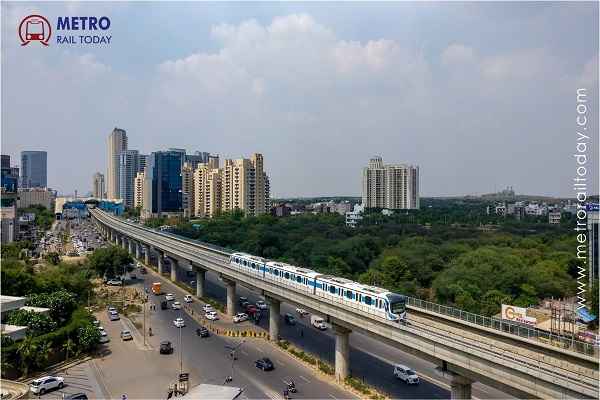
In an era defined by rapid technological advancement, the realm of public transportation stands on the brink of a profound transformation. At the forefront of this evolution is blockchain technology, a decentralized and transparent system that has transcended its origins in crypto currency to revolutionize various industries. Now, blockchain is poised to redefine public mobility across metro systems, Mass Rapid Transit Systems (MRTS), railways, and buses, offering innovative solutions to longstanding challenges and paving the way for a future of seamless, efficient, and interconnected transit networks. Here, we explore how block-chain is reshaping public transportation, from ticketing and fare management to data security and decentralized mobility services, and examine the transformative potential of blockchain-powered transit in enhancing the mobility experience for commuters worldwide.
Blockchain: Revolutionizing Ticketing and Fare Management in Public Transportation
Blockchain technology is reshaping ticketing and fare management systems across various modes of public transportation, including metro, MRTS, railways, and buses. Traditionally, these systems have suffered from inefficiencies, inconsistencies, and vulnerabilities to fraud. However, blockchain presents a transformative solution by providing a decentralized and tamper-proof platform for handling ticketing and fare transactions. With blockchain-powered ticketing systems, commuters enjoy a seamless and secure experience, eliminating the need for traditional paper tickets or magnetic cards. Smart contracts automate ticket purchases, validations, and fare settlements, ensuring integrity and accuracy while reducing the risk of revenue leakage and fraudulent activities. Blockchain also enables interoperability between different modes of transit, allowing commuters to use a single ticket or payment method across various transportation networks, promoting seamless connectivity and enhancing the overall transit experience. Furthermore, blockchain enhances transparency and accountability in fare management by providing a verifiable record of all transactions. Transportation authorities can track fare revenues, monitor ticket sales, and reconcile discrepancies in real-time, improving revenue management and ensuring fair practices. Enhanced security features protect against unauthorized access, ticket counterfeiting, and fraud, as blockchain's decentralized nature encrypts ticketing data and provides tamper-proof record-keeping. These advancements represent a significant step forward in transforming public mobility across metro, MRTS, railways, and buses, streamlining processes, improving practices, and ultimately leading to a more enjoyable commuting experience for all. The following case studies demonstrate how blockchain technology is revolutionizing ticketing and fare management in public transportation globally, leading to more efficient, transparent, and secure transit experiences for commuters. Through the adoption of blockchain-powered solutions, transportation authorities can streamline processes, improve practices, and enhance the overall quality of public transportation services.
Case Study 1: Singapore's Land Transport Authority (LTA) - TransitLink
Singapore's LTA partnered with TransitLink to implement a blockchain-based ticketing and fare management system, aiming to enhance efficiency and transparency. Commuters could use a mobile app or contactless smart card with blockchain technology to pay fares across various modes of transportation. Blockchain-powered smart contracts automated fare validations, promoting seamless connectivity and enhancing transparency and accountability in fare management.
Case Study 2: Australia's Queensland Rail - Go Card
Queensland Rail introduced the Go Card, a blockchain-powered ticketing system, revolutionizing fare management across its rail network. Commuters could use a contactless smart card embedded with blockchain technology to tap on and off trains, buses, and ferries. Blockchain ensured secure and transparent fare transactions, while smart contracts automated fare validations, promoting seamless connectivity and enhancing security in fare management.
Unlocking Seamless Mobility: Blockchain's Role in Interconnected Transit Networks
Achieving seamless connectivity between different modes of transit, such as metro, Mass Rapid Transit Systems (MRTS), railways, and buses, poses a significant challenge in urban transportation. Traditionally, disparate fare systems and lack of integration between transit networks have hindered commuters' ability to navigate efficiently. However, blockchain technology offers innovative solutions to revolutionize interconnected transit networks. Blockchain-powered transit systems enable interoperability, allowing commuters to use a single ticket or payment method across various modes of transportation. By eliminating the need for separate fare systems, blockchain enhances connectivity and transit experiences. With blockchain-based smart contracts, fare transactions are transparently recorded on the blockchain ledger, ensuring accuracy and integrity without the hassle of dealing with incompatible fare systems. Moreover, blockchain facilitates real-time data sharing and communication among transportation authorities, optimizing routes and schedules for enhanced service reliability. Furthermore, blockchain-enabled interoperability fosters innovation in transit services, promoting sustainable and multimodal travel options. The following case studies highlight how blockchain technology unlocks seamless mobility and enhances connectivity in public transportation systems globally. Leveraging blockchain-powered solutions, transportation authorities can create efficient and integrated transit networks, meeting the evolving needs of urban commuters.
Case Study 1: Singapore's Land Transport Authority (LTA) - TransitLink
Singapore's LTA collaborated with TransitLink to implement a blockchain-based solution, addressing challenges in fare systems and integration between transit networks. Commuters were provided with blockchain-powered transit cards, enabling seamless transfers and transparent fare transactions across various modes of transportation. Real-time data sharing enhanced operational efficiency, reducing congestion and improving service reliability.
Case Study 2: Estonia's Smart Ticketing System
Estonia implemented a blockchain-based smart ticketing system to achieve seamless mobility across its public transportation networks. Commuters accessed transportation services seamlessly using a digital wallet, storing transit tickets and payment information securely on the blockchain ledger. Blockchain-enabled interoperability facilitated dynamic route optimization, enhancing user experience and promoting sustainable travel options.
Decentralizing Transit: Blockchain's Revolution in Public Mobility
Achieving seamless connectivity and enhancing mobility services across different transit modes like the metro, Mass Rapid Transit Systems (MRTS), railways, and buses, has long been a challenge in public transportation. However, blockchain technology emerges as a game-changer, poised to revolutionize public mobility by offering decentralized solutions that streamline transit experiences for commuters. Blockchain-powered transit systems introduce decentralized mobility services, empowering commuters with greater flexibility, accessibility, and convenience across various transportation modes. Leveraging blockchain technology, transportation authorities can introduce innovative mobility solutions that significantly enhance the overall transit experience. A key feature of decentralized mobility services is the interoperability between different transit modes facilitated by blockchain. It seamlessly integrates metro, MRTS, railways, and buses, allowing commuters to utilize a single ticket or payment method across various transportation networks, eradicating the need for separate fare systems and fostering interconnectedness. Moreover, blockchain technology drives the development of decentralized mobility-as-a-service (MaaS) platforms. These platforms empower commuters to seamlessly plan, book, and pay for their journeys through a unified digital platform, offering personalized transit solutions tailored to individual preferences and travel needs while ensuring transparency and security.Additionally, blockchain-enabled decentralized mobility services promote peer-to-peer transactions and collaborative transportation models, optimizing transit routes and reducing congestion. Furthermore, blockchain technology significantly enhances data privacy and security within decentralized mobility services by encrypting sensitive information and providing tamper-proof record-keeping, ensuring the protection of commuters' personal data. In summary, blockchain-powered transit transforms public mobility across metro, MRTS, railways, and buses, offering decentralized mobility services that enhance interoperability, accessibility, and convenience for commuters. By leveraging blockchain technology, transportation authorities can establish more efficient, user-centric transit networks that meet the evolving needs of urban commuters, ushering in a future of seamless and interconnected public transportation.
Case Study 1: Denver, Colorado - Go Denver App
In Denver, Colorado, the Regional Transportation District (RTD) implemented the Go Denver app, leveraging blockchain technology to decentralize transit services and enhance public mobility. Serving as a decentralized mobility platform, the Go Denver app seamlessly integrates various transit modes, including buses, light rail, and ridesharing services, providing commuters with personalized transit solutions. Commuters can plan, book, and pay for their journeys using a single digital platform, eliminating the need for multiple transit apps or fare systems. Blockchain technology ensures secure and transparent transactions, preserving the integrity and privacy of commuter data while facilitating seamless interoperability between transit modes.
Case Study 2: Dubai, United Arab Emirates - Dubai Blockchain Strategy
Dubai has spearheaded a comprehensive blockchain strategy to decentralize transit services and revolutionize public mobility. As part of the Dubai Blockchain Strategy, the Roads and Transport Authority (RTA) introduced blockchain-powered solutions to enhance connectivity and convenience for commuters. Notably, blockchain technology has been integrated into the Nol Card system, Dubai's unified transit fare card, enabling secure and transparent transactions across various transit modes, including metro, tram, buses, and water taxis. Additionally, Dubai's blockchain strategy encompasses the development of decentralized mobility-as-a-service (MaaS) platforms, offering commuters personalized transit solutions tailored to their preferences and travel needs. With blockchain technology ensuring data privacy and security, commuters trust in utilizing decentralized mobility services, fostering greater confidence and reliability in Dubai's public transportation system.
Securing Public Transit: Blockchain's Role in Enhancing Data Privacy and Security
In the context of public transportation, ensuring the security and privacy of commuter data is paramount. Traditional transit systems often face challenges related to data security breaches and privacy concerns, particularly with the collection and storage of sensitive information such as payment details and travel patterns. However, blockchain technology offers innovative solutions to address these issues and enhance data security and privacy across metro, Mass Rapid Transit Systems (MRTS), railways, and buses. Blockchain-powered transit systems leverage decentralized and cryptographic principles to ensure the security and privacy of commuter data. Unlike centralized systems where data is stored in a single location and vulnerable to hacking or unauthorized access, blockchain distributes data across a network of nodes, making it inherently more secure and resistant to tampering. Its immutability ensures the integrity of commuter data, protecting against fraudulent activities or unauthorized modifications. Moreover, blockchain technology employs cryptographic techniques such as encryption to secure sensitive information stored on the blockchain ledger. Each transaction is encrypted, making it virtually impossible for unauthorized parties to access or decipher the data without the corresponding cryptographic keys. Additionally, blockchain-powered transit systems enhance privacy by allowing commuters to maintain control over their personal data through decentralized identity solutions and self-sovereign identity principles. Furthermore, blockchain technology facilitates transparency and accountability in data management by providing a transparent and auditable record of all transactions. Commuters can trust that their data is handled securely and in compliance with privacy regulations, fostering greater trust and confidence in the transit system. Overall, blockchain-powered transit is transforming public mobility by enhancing data security and privacy across various transit modes. By leveraging blockchain technology, transportation authorities can ensure the integrity, confidentiality, and transparency of commuter data, ultimately leading to a safer and more trustworthy transit experience for all passengers.
Case Study 1: Transport for London (TfL) - Oyster Card System
Transport for London (TfL), one of the world's largest integrated transportation authorities, has implemented blockchain technology to enhance data privacy and security within its Oyster Card system. The Oyster Card is a contactless smart card used by millions of commuters to pay for travel across London's extensive public transit network. TfL has integrated blockchain technology into the backend infrastructure of the Oyster Card system to enhance the security and privacy of commuter data. By leveraging blockchain's decentralized architecture, TfL ensures that sensitive information is stored securely across a distributed network of nodes. Moreover, blockchain technology enables immutable record-keeping, safeguarding the integrity of commuter data. Additionally, cryptographic techniques such as encryption secure commuter data stored on the blockchain ledger. By implementing blockchain technology within the Oyster Card system, TfL enhances data privacy and security, fostering greater trust among commuters in the reliability and integrity of London's public transit network.
Case Study 2: Seoul Metropolitan Government - ZeroPay Transit System
The Seoul Metropolitan Government in South Korea has introduced the ZeroPay Transit System, powered by blockchain technology, to enhance data privacy and security in public transit payments. ZeroPay is a mobile payment platform that allows commuters to pay for transit fares using their smartphones, eliminating the need for physical smart cards or cash. Blockchain technology forms the backbone of the ZeroPay Transit System, ensuring the security and privacy of commuter payment data. By leveraging blockchain's decentralized architecture, the Seoul Metropolitan Government ensures that sensitive payment information is stored securely across a distributed network of nodes. Furthermore, blockchain technology enables transparent and auditable record-keeping, providing commuters with visibility into their payment transactions while maintaining the confidentiality of their personal data. Each transaction conducted using the ZeroPay platform is recorded on the blockchain ledger, providing a tamper-proof and immutable record of payment activity. Overall, the implementation of blockchain technology within the ZeroPay Transit System by the Seoul Metropolitan Government demonstrates how decentralized solutions can enhance data privacy and security in public transit payments, ultimately leading to a safer and more reliable transit experience for commuters in Seoul.
Transparent Governance and Accountability in Public Transit: How Blockchain is Shaping the Future
In the landscape of public transportation, ensuring transparent governance and accountability has been a longstanding challenge. Traditional transit systems often struggle with issues related to transparency in decision-making processes, accountability for service quality, and the efficient allocation of resources. However, with the emergence of blockchain technology, there is a transformative opportunity to revolutionize the governance and accountability structures within metro, Mass Rapid Transit Systems (MRTS), railways, and buses. Blockchain technology offers a decentralized and transparent framework for governance, enabling stakeholders to participate in decision-making processes and ensuring accountability across all levels of the transit ecosystem. By leveraging blockchain-powered solutions, transportation authorities can introduce innovative approaches to governance and accountability that promote transparency, efficiency, and trustworthiness. Key among these features is blockchain's immutable and transparent nature, ensuring every transaction or decision recorded on the blockchain is cryptographically secured and stored across a distributed network of nodes. This fosters greater transparency in how public transit services are managed and optimized. Moreover, blockchain technology facilitates smart contracts, which automate governance processes such as procurement, maintenance scheduling, and fare collection, thereby reducing the potential for human error, fraud, or corruption. Through smart contracts, transportation authorities can ensure that decisions are executed transparently and in accordance with predefined rules, promoting accountability and efficiency in service delivery. Additionally, blockchain-enabled transparency extends to financial transactions and funding allocations within the public transit ecosystem. By recording financial transactions on the blockchain, transportation authorities can ensure that funds are allocated and utilized transparently, with clear visibility into expenditure patterns and budgetary allocations. This transparency fosters accountability among transit agencies and enables stakeholders to hold authorities accountable for the efficient use of public funds.
Case Study 1: Singapore's Land Transport Authority (LTA) - Blockchain-Powered Transit Management
Singapore's Land Transport Authority (LTA) has been at the forefront of leveraging blockchain technology to enhance transparent governance and accountability in public transit. Recognizing the importance of transparency in decision-making processes and resource allocation, the LTA partnered with blockchain experts to implement a blockchain-powered transit management system. Through this initiative, the LTA introduced a decentralized governance framework that allows stakeholders, including commuters, transit operators, and government agencies, to participate in decision-making processes transparently. Using blockchain technology, the LTA established a secure and immutable record of governance decisions, service operations, and resource allocations within the public transit ecosystem. One of the key features of the blockchain-powered transit management system is its ability to automate governance processes through smart contracts. Smart contracts are used to streamline procurement, maintenance scheduling, and fare collection, reducing the potential for human error and enhancing accountability in service delivery. Moreover, the transparency enabled by blockchain technology extends to financial transactions and funding allocations within the public transit ecosystem. By recording financial transactions on the blockchain, the LTA ensures that funds are allocated and utilized transparently, with clear visibility into expenditure patterns and budgetary allocations. The implementation of blockchain-powered transit management by the LTA has led to greater public trust, improved service quality, and enhanced accountability in Singapore's public transit system. Commuters and stakeholders have confidence in the integrity of governance processes and the efficient use of public funds, fostering a more sustainable and reliable transit ecosystem.
Case Study 2: Transport for London (TfL) - Blockchain-Enabled Governance and Accountability
Transport for London (TfL), one of the world's largest integrated transportation authorities, has embraced blockchain technology to enhance transparent governance and accountability in public transit. TfL recognized the need for greater transparency in decision-making processes and resource management, particularly in the context of London's extensive public transit network. To address these challenges, TfL integrated blockchain technology into its governance and accountability framework, establishing a decentralized and transparent system for managing public transit operations. Through blockchain-powered solutions, TfL ensures that governance decisions, service operations, and resource allocations are recorded securely and transparently on the blockchain ledger. Smart contracts play a pivotal role in automating governance processes within TfL's transit ecosystem. Smart contracts are utilized to streamline procurement, maintenance scheduling, and fare collection, enabling TfL to improve operational efficiency and accountability in service delivery. Additionally, blockchain technology enables transparent financial transactions and funding allocations within TfL's public transit ecosystem. By recording financial transactions on the blockchain, TfL provides stakeholders with clear visibility into expenditure patterns and budgetary allocations, fostering greater accountability and trust among commuters and transit agencies. The implementation of blockchain-enabled governance and accountability by TfL has led to tangible benefits, including improved service quality, enhanced transparency, and greater public confidence in London's public transit system. Through blockchain technology, TfL has created a more accountable, efficient, and trustworthy transit ecosystem that meets the needs of commuters and promotes sustainable urban mobility.
Key Takeaways
Enhanced Interoperability: Blockchain technology enables seamless integration between various modes of transit such as metro, Mass Rapid Transit Systems (MRTS), railways, and buses. This interoperability allows commuters to use a single ticket or payment method across different transportation networks, promoting interconnectedness and facilitating smoother transitions between transit modes.
Decentralized Mobility Services: Blockchain-powered transit systems offer decentralized mobility services, empowering commuters with greater flexibility, accessibility, and convenience. Commuters can plan, book, and pay for their journeys seamlessly through unified digital platforms, eliminating the need for multiple transit apps or fare systems.
Peer-to-Peer Transactions: Blockchain technology facilitates peer-to-peer transactions and collaborative transportation models such as decentralized ride-sharing and micro-transit services. Commuters can connect with nearby drivers or fellow commuters heading in the same direction, optimizing transit routes and reducing congestion.
Data Privacy and Security: Blockchain technology enhances data privacy and security in decentralized mobility services by encrypting sensitive information and providing tamper-proof record-keeping. Commuters can trust that their personal data is protected; fostering greater confidence in utilizing decentralized mobility solutions.
Transparent Governance and Accountability: Blockchain introduces transparent governance and accountability mechanisms within public transit systems. Decentralized frameworks allow stakeholders to participate in decision-making processes transparently, while smart contracts automate governance processes and ensure compliance with predefined rules.
Case Studies: Real-world examples such as Denver's Go Denver app and Dubai's Blockchain Strategy showcase how blockchain technology is revolutionizing public mobility. These case studies demonstrate the tangible benefits of blockchain-powered transit, including enhanced transparency, efficiency, and trustworthiness.
Future of Public Mobility: Blockchain-powered transit is transforming public mobility by creating more efficient, user-centric transit networks. As public transportation continues to evolve, blockchain technology will play a pivotal role in shaping the future of mobility, governance, and accountability in urban transit systems.
Conclusion
Blockchain-powered transit represents a significant leap forward in revolutionizing public mobility across metro, Mass Rapid Transit Systems (MRTS), railways, and buses. The integration of blockchain technology into public transit systems offers transformative solutions that address longstanding challenges and pave the way for a more efficient, accessible and user-centric transportation experience. By enhancing interoperability between different modes of transit and introducing decentralized mobility services, blockchain technology empowers commuters with greater flexibility and convenience. Commuters can seamlessly plan, book, and pay for their journeys through unified digital platforms, eliminating the complexities associated with traditional transit systems. Moreover, blockchain technology ensures data privacy and security, safeguarding commuters' personal information through encryption and tamper-proof record-keeping. This instils confidence in commuters to embrace decentralized mobility solutions, knowing that their data is protected and their privacy respected. The implementation of transparent governance and accountability mechanisms further enhances the credibility and reliability of public transit systems. Through decentralized frameworks and smart contracts, stakeholders can participate in decision-making processes transparently, while automated governance processes ensure compliance with predefined rules and regulations. Real-world case studies, such as Denver's Go Denver app and Dubai's Blockchain Strategy, demonstrate the tangible benefits of blockchain-powered transit in enhancing transparency, efficiency, and trustworthiness within public mobility networks. As we look to the future, blockchain technology will continue to play a pivotal role in shaping the evolution of public mobility. By embracing blockchain-powered solutions, transportation authorities can create more resilient, sustainable, and user-centric transit networks that meet the evolving needs of urban commuters and foster a seamless and interconnected transportation ecosystem for all.




